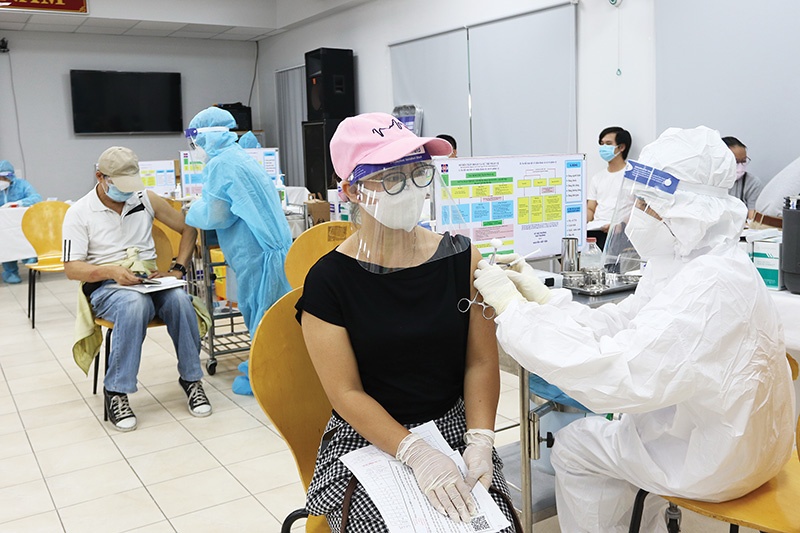Healthcare tops priority list for investment to blossom
 |
| Vaibhav Saxena - CEO, NV Global Group |
Since 2019 there has been a clear upward spike as Vietnam’s population was estimated to be 96 million, of which people aged 65 and older accounted for 7.7 per cent, showing that the country’s population is ageing rapidly. According to the World Bank, Vietnam is one of the most developed economies in the region. The average income per capita was approximately $2,600 in 2019 and is expected to increase to just over $10,000 by 2030. The notably improved living conditions have contributed to raising the demand for healthcare, and for pharmaceutical products in particular.
However, the pharmaceutical industry in Vietnam grew by merely 2.8 per cent in recent times, which is much lower than its average 11.8 per cent growth in the last 5-6 years. It is expected to recover and grow by around 15 per cent in the coming 2-3 years, mainly due to a rapidly ageing population and increasing incomes.
The global pandemic has hindered the country’s growth and implications on the overall pharmaceutical industry worldwide and in Vietnam are evident, with the exception of vaccine manufacturing and sales revenues for some companies. Social distancing and strict control at hospitals resulted in people avoiding going to hospital with minor ailments, meaning lower sales of both prescription and non-prescription drugs. Both patented and generic drugs dropped in demand and even the frequency of health checks fell by around 10-15 per cent in the third quarter.
Elsewhere, last year there was a shortage in supply of active pharmaceutical ingredients (API) from India and China due to the pandemic, and increasing demand for such APIs caused drug prices to shoot up. India and China account for around 55 per cent of the global API supply and nearly 70 per cent of Vietnam’s requirements. The prices of most APIs increased by 5-8 per cent and several pharmaceutical companies’ gross profit margins were seen dipping by 1-3 per cent in 2020.
On the other hand, due to the extreme rise in COVID-19 cases in 2021 in this country, the construction of new pharmaceutical units fell behind schedule and the industry is yet to pick up the pace to regain its momentum.
However, 2020 and 2021 were nonetheless still prominent for mergers and acquisitions (M&A) in the sector. According to some private research companies, the total value of such deals was noted at around $73 million and involved the vast participation of foreign investors.
 |
| Some pharmaceutical plans were placed on the back-burner this year because of COVID-19. Photo: Le Toan |
Business and policy aspects
In 2016, the government issued Decree No.36/2016 on medical devices management. Under Decree 36, all medical devices imported into Vietnam are required to register for marketing authorisation (MA) licences. Further, at the end of 2018, the government issued Decree No.169/2018 providing amendments and additions to Decree 36. Thereafter, Decree No.03/2020 was issued last year to amend provisions of Decree 169 and extend the registration deadline for class B, C, and D devices to the end of this year.
The Law on Pharmacy, which entered into force in 2017, acts as the primary legislation governing the pharmaceutical sector in Vietnam, including registration, sale, and distribution of pharmaceuticals. Following the said law, Decree No.54/2017 dated May 2017 was released to provide guidance on the law on pharmacy.
Decree 54 provides requirements for pharmacy practice certificates; pharmacy businesses; export and import of drugs; assessment of overseas drug manufacturers; registration of herbal ingredients, excipients, and capsule shells; procedures for recalling and handling medicinal ingredients; and details of the process for issuance of the certification of drug advertisement and drug price management.
Thereafter, Decree No.155/2018 was released to amend some articles related to business conditions under state management of the Ministry of Health (MoH) and allowing foreign companies with representative offices to establish foreign-invested enterprises in Vietnam.
Effective in September 2019, the MoH published Circular No.32/2018 regulating the MA of drugs and medicinal ingredients. The MoH also issued Circular No.29/2020 to provide amendments to and abrogation of some legislative documents promulgated or jointly promulgated by the MoH. Accordingly, effective periods of MA that expire during the period from January 2018 to the end of 2021, including those that have their effect maintained, will be extended by further 12 months.
Meanwhile, at the end of a two-year transitional period after the ratification of the EU-Vietnam Free Trade Agreement (EVFTA), EU companies will be able to access the relevant public procurement markets here. This access is conditional on the respect of thresholds, whose values will be gradually lowered within 15 years. This shall support MoH and public hospitals to centralise purchases of pharmaceutical products.
Under the EVFTA, EU companies are given green light to establish a pharmaceutical company in Vietnam. The country has also committed to protect the data of pharmaceutical products resulting from tests for a period of five years. However, when the disclosure of data results from a prerequisite for obtaining an MA for pharmaceutical products, the country commits to protecting such data against unfair commercial exploitation. The EVFTA will also boost M&A transactions in this country’s pharmaceutical industry significantly.
Pros and cons
Local private hospitals are expected to show stable growth, while there can be possibilities seen with research and educational institutions as they remain open to experimenting with new equipment and modern methods. It can be seen as a clean strategic opportunity to nurture business.
Significant public funds have been allocated to upgrade hospitals in various provinces. Numerous small-scale projects are under progress in Vietnam, including several funded by the EU and the World Bank.
Recently, the local market has seen a number of companies focusing on putting money into research and development (R&D) activities to develop patented drugs. Local companies face issues when it comes to domestic production of such drugs due to limited R&D capabilities, capital limitations, and partial high-end human resources. Limited certifications such as EU-GMP or PIC/S-GMP standards to manufacture high-end generic drugs also remains a hurdle, thus the heavy reliance on imported drugs persists.
COVID-19 dampened economic activity in Vietnam to a large extent, but it is unlikely to reverse ongoing socioeconomic changes. In fact, the health sector stands firmly as the top priority and concern, both globally and in this country.
What the stars mean:
★ Poor ★ ★ Promising ★★★ Good ★★★★ Very good ★★★★★ Exceptional
Themes: COP26 - Together for Our Planet
Related Contents
Latest News
More News
- Canada pledges $81 million for initiatives in Vietnam (January 20, 2026 | 11:41)
- KK Group opens global flagship store in Ho Chi Minh City (January 19, 2026 | 11:52)
- Gia Lai draws over $1bn in new investment so far this year (January 19, 2026 | 11:50)
- Unlocking capital flows for strategic and suitable projects (January 18, 2026 | 09:00)
- ACV begins cargo terminal construction at Danang Airport (January 17, 2026 | 15:57)
- Viettel starts construction of semiconductor chip production plant (January 16, 2026 | 21:30)
- Bel expands Vietnam production with $19.7 million investment (January 16, 2026 | 16:07)
- ASML signals long-term commitment to Vietnam (January 16, 2026 | 12:00)
- Ho Chi Minh City starts construction of four key infrastructure projects (January 15, 2026 | 17:22)
- PIDG invests with AquaOne to expand Xuan Mai’s treated water supply to Hanoi (January 15, 2026 | 11:16)

 Tag:
Tag:




















 Mobile Version
Mobile Version